Rush Blu-ray Movie
HomeRush Blu-ray Movie 
Kino Lorber | 1991 | 120 min | Rated R | Jul 14, 2015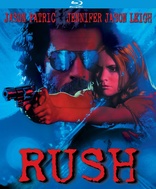
Movie rating
7.1 | / 10 |
Blu-ray rating
| Users | 3.5 | |
| Reviewer | 3.5 | |
| Overall | 3.5 |
Overview
Rush (1991)
Two small town Texas cops go undercover to catch a major drug dealer and are sucked into the drug culture, compromising their assignment.
Starring: Jason Patric, Jennifer Jason Leigh, Sam Elliott, Max Perlich, Gregg AllmanDirector: Lili Fini Zanuck
| Thriller | Uncertain |
| Crime | Uncertain |
| Drama | Uncertain |
Specifications
Video
Video codec: MPEG-4 AVC
Video resolution: 1080p
Aspect ratio: 1.85:1
Original aspect ratio: 1.85:1
Audio
English: DTS-HD Master Audio 5.1 (48kHz, 16-bit)
English: DTS-HD Master Audio 2.0
Subtitles
English
Discs
25GB Blu-ray Disc
Single disc (1 BD)
Playback
Region A (C untested)
Review
Rating summary
| Movie | 4.0 | |
| Video | 3.0 | |
| Audio | 3.5 | |
| Extras | 3.5 | |
| Overall | 3.5 |
Rush Blu-ray Movie Review
No One's Your Friend
Reviewed by Michael Reuben July 14, 2015The 1991 film Rush (not to be confused with Ron Howard's racing film of the same name) is the only feature to be directed by producer Lili Fini Zanuck, but it's the product of an accomplished filmmaker with a distinctive voice. Rush may not be the kind of light entertainment you pull out and watch every month or so but, once seen, its sights and sounds stay with you. Zanuck isn't attracted to conventional stories and she doesn't tell them in a familiar way. She made her reputation producing Cocoon with her late husband, Richard, on which studio executives initially passed, insisting that no one wanted to see a movie about aliens and old people. Then, after Cocoon was a hit, the same studio executives passed on Driving Miss Daisy, because it was just about old people—where were the aliens? Miss Daisy, too, was a hit. It also won the Zanucks an Oscar for Best Picture. Rush is based on an autobiographical novel by Kim Wozencraft about her experiences working as an undercover narc for the Tyler, Texas police department. It eventually came out that Wozencraft and her partner had falsified cases that sent people to jail, and both of them served prison terms for civil rights abuses. Rush portrays the bizarre netherworld of undercover life, in which the requirements of blending in and persuading dealers that one isn't a cop make it all too easy to slip into addiction, which the narcs justified to themselves in the name of the greater good—but then they end up using the drugs they buy instead of turning them in. With a script by novelist Pete Dexter, Zanuck set out to portray this world from the undercover cop's point of view: isolated, dirty both physically and morally and always nerve-rackingly dangerous.
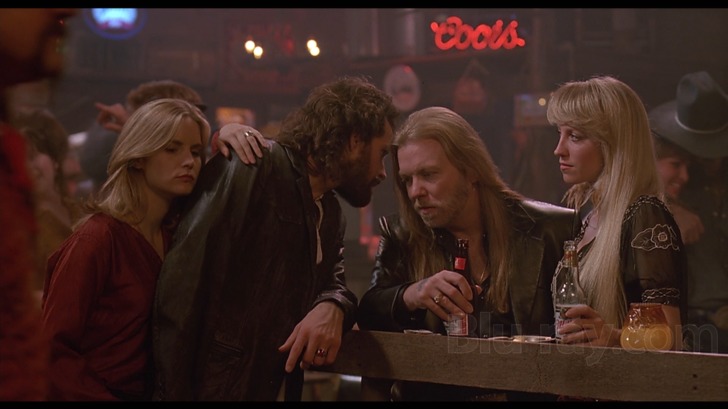
Zanuck's unconventional approach is apparent in her casting of Rush's principal villain, Will Gaines, a bar owner who is believed to be the chief drug trafficker for the entire region surrounding the fictional town of Katterly, Texas. The director wanted someone with the swagger and appearance of rock star Gregg Allman, but when her casting people couldn't find anyone who fit the bill, she persuaded Allman himself to play the role. The rocker has maybe a dozen lines and limited screen time, but he makes such a strong impression that the awe and fear inspired by Gaines in every mid-level dealer are instantly credible. As Zanuck grasped immediately, Allman didn't have to act; he just had to let the camera capture a certain kind of confidence exuded by both criminal overlords and musicians accustomed to playing before cheering multitudes. Gaines is the bęte noire of Acting Sheriff Nettle (Tony Frank), who has sworn to clean up Ketterly to both the town council and the church where he is a deacon. Nettle, in turn, is pressuring Chief Dodd (Sam Elliott) to build a case against Gaines, for which Dodd turns to his best undercover man, Jim Raynor (Jason Patric). Offered his pick of partners fresh out of the academy, Raynor selects Kristen Cates (Jennifer Jason Leigh) after watching her run faster than her male classmates. He thinks she has an "edge" to her. Dodd is concerned but accepts Raynor's choice. Rush is less about the mechanics of undercover work than about the intimate partnership that develops between Raynor and Cates. It very quickly becomes obvious why Raynor chose a woman, as he and Cates set about the laborious and often tedious business of hanging out with junkies and dealers, establishing their presence and building sufficient credibility to persuade Gaines to sell to them directly (or so they hope). A male/female pairing blends in far more naturally than two men, and the fact that Cates is attractive provides an added lure for some of the dealers the undercover cops ensnare, such as construction worker Walker (Max Perlich), whom they eventually pressure into becoming a snitch. At the same time, Dodd's concerns are genuine. He suspects Raynor of recruiting Cates as a sex partner, in part because he knows that's what the moralistic Nettle will think and in part because he is an undercover veteran who understands its loneliness and temptations. At one level, Raynor's tutelage of his new partner plays like a crash course in the essential tools of survival in a world where one hint of your real identity will get you killed, but at another level, Raynor almost seems to be tying Cates to him in the manner of an abusive spouse: Trust no one other than me; everyone else is an outsider, even our bosses. With the constant danger, adrenaline and sufficient drug use to convince the dealers that Raynor and Cates aren't cops, it would be a miracle if the partners did not commence an intense physical relationship. It would also be a miracle if they did not become addicts, which eventually they do. Although Raynor demonstrates how to shoot up with substitutes like baby laxative (on the commentary, Zanuck confirms that Jason Patric injected himself for real, using saline solution), eventually the partners are forced to inject real heroin at gunpoint by a dealer named Willie Red (standup comic Special K. McCray, who manages to be both mellow and terrifying at the same time). Picking up a load of home-baked hallucinogens from a meth cooker named Monroe (William Sadler), Cates is forced to swallow one before driving home. Monroe's method of confirming she took the pill is intensely personal. When Dodd stops hearing from his team, he comes looking and finds them trying to kick their habits. (This being the 1970s, rehab did not yet exist.) That's when Nettle begins applying serious pressure to "make the case" against Gaines, by any means necessary, even though the top dealer won't come near them. "Do you think I'm stupid?" he says on one of the few occasions he deigns to speak to Raynor. Caught in an impossible situation, Raynor and Cates make the best of the bad choices available, and serious consequences unfold. Screenwriter Dexter has altered the conclusion of the story from both Wozencraft's novel and the events of her real life, but his resolution honors the relationship between the partners while, at the same time, acknowledging the futility of their enterprise. Zanuck was asked whether she made Rush because of her own history with drugs, to which she replied that she had as much history with drugs as Francis Ford Coppola had with the mob. What attracted her to the story was an unusual relationship between a man and a woman, in which neither was heroic but the woman was much more than a damsel in distress. Both Cates and Raynor are flawed human beings, who find themselves in a situation that even much better cops would find difficult to navigate without, as Raynor says, "getting dirty". But Cates's evolution is the more interesting and complex, because she begins as a fresh-faced ingenue, filled with idealism, whose naivete is quickly shattered by the realities of undercover work and the confrontation with a heartless evil unlike anything she imagined. Jennifer Jason Leigh played Cates during the most fertile years of her screen career, and the portrayal joins Last Exit to Brooklyn and Miami Blues as some of her finest screen work.
Rush Blu-ray Movie, Video Quality 
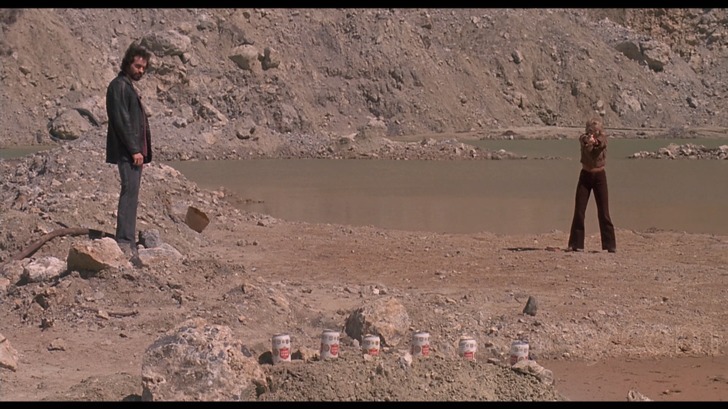
Rush was shot by cinematographer Kenneth MacMillan, who provided the dark, gritty look for Kenneth Branagh's Henry V. Kino's 1080p, AVC-encoded Blu- ray has been taken from source material provided by MGM that's in good shape with only minor speckling and no major damage. The earth-toned color palette suits the hot Texas location (the film was shot in and around Houston) as well as the sweaty discomfort of the conspiratorial world in which Raynor and Cates operate. The image is generally clean and sharp, but some of that comes at the expense of fine detail and the film's natural grain pattern, which appears to have been filtered of high frequency information here and there, no doubt to facilitate the compression of this two-hour film onto a BD-25 (with extras and multiple soundtracks). Some light sharpening is also evident, though not to the extent that it become intrusive. Rush has been encoded with an average bitrate of 19.85 Mbps, which is quite low. Although no obvious artifacts leapt out, this is no doubt due to the large number of static scenes, usually one- or two-shots, that allow for the conservation of bits. A master that looked somewhat less electronic and more organic would no doubt require less compression and a higher average bitrate, which could only be accomplished on a BD-50.
Rush Blu-ray Movie, Audio Quality 
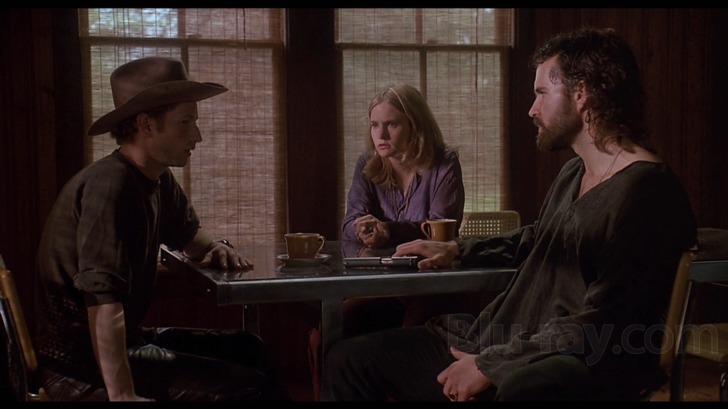
Rush was released to theaters in Dolby Stereo, but the soundtrack was remixed for DVD in 5.1, which is presumably the same version encoded here in lossless DTS-HD MA 5.1. The original 2.0 mix is also included, also in lossless DTS-HD MA. Both Blu-ray tracks have been encoded at an unusually low volume, with the 5.1 track more noticeably so. I had to increase my usual playback volume by 5 db to obtain an acceptable listening experience. With the exception of occasional gunshots (e.g., near the beginning, when Raynor is testing Cates's skill), the sound of car engines (such as the opening sequence, when Gaines leaves his club), or an environment-specific sound (like the sound of hammers at one of Walker's construction job sites), the soundtrack for Rush is defined by the score composed by legendary guitarist Eric Clapton, whom Zanuck pursued relentlessly for the job. Like the casting of Gregg Allman as Gaines, Clapton's guitar was essential to Zanuck's conception of the film. She used his existing recordings as a temp score and had no backup plan if Clapton said no. Although the singer/songwriter's works had often been used in films (e.g., in the previous year's Goodfellas), Clapton rarely composed entire soundtracks, and his piercing blues guitar is an essential expression of the characters' experiences in Rush, conveying the depth of their isolation and dependence on each other. (Other important songs on the soundtrack come from such musicians as Bonnie Raitt, Bob Dylan, Johnny Winter, Lynyrd Skynyrd and Jimi Hendrix.) The dialogue is clear, once the volume has been sufficiently raised.
Rush Blu-ray Movie, Special Features and Extras 
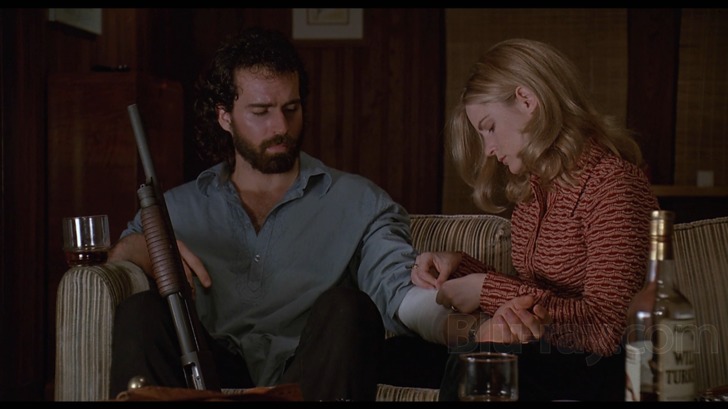
The extras have been ported over from MGM's 2002 DVD of Rush.
- Commentary with Director Lili Fini Zanuck: Zanuck is informative about what drew her to this particular story, the casting process, how she worked with the actors and what she wanted to accomplish with the film. As much as she had definite ideas about certain elements from the outset, she is frank about what surprised her, both in the logistics of filmmaking and in the contributions of her cast. She is equally frank about story elements that she finds especially resonant because they are unique to the situation of a female protagonist. What is notable about those story elements, though, is how they are never emphasized in the film. Zanuck just puts them into the story, and viewers either notice them or they don't. A major example is the difference in how Cates handles withdrawal versus Raynor.
- Making of Featurette (480i; 1.33:1; 8:51): This vintage featurette includes interviews with Zanuck, Patric, Leigh, Allman and Clapton.
- "Tears in Heaven" Music Video—Eric Clapton (480i; 1.33:1; 4:43): The video combines scenes from the film with clips of Clapton performing solo.
- Theatrical Trailer (480i; 1.85:1, enhanced; 2:20): "It was the job that was all wrong."
Rush Blu-ray Movie, Overall Score and Recommendation 
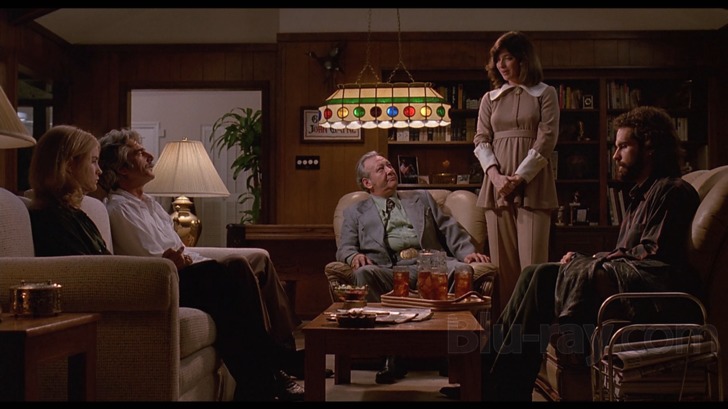
Rush is the kind of stubbornly personal film that results from a determined artist pursuing a definite vision. Such creations are becoming rare birds in the major studios, although cable networks and independent companies like Magnolia and IFC still provide homes for them. Zanuck has freely admitted that she made the movie she wanted to see, without knowing whether anyone else would respond. Count me among the fans. Kino's Blu-ray presentation isn't the best possible, but it will do. Recommended.
Similar titles
Similar titles you might also like

White Sands
1992

Blue Steel
Vestron Collector's Series
1990

Narc 4K
Limited Edition
2002

Report to the Commissioner
1975

I, the Jury
1982

Bullets or Ballots
1936

State of Grace
1990

Fuzz
1972

Electra Glide in Blue
4K Restoration
1973

High School Confidential
1958

Jackson County Jail
1976

The Postman Always Rings Twice
1981

Sea of Love 4K
1989

The Atomic City
1952

Who'll Stop the Rain
1978

The Blue Lamp
1950

The Miami Story
1954

The Taking of Pelham One Two Three 4K
1974

Traffic
2000

The Crossing Guard
1995
